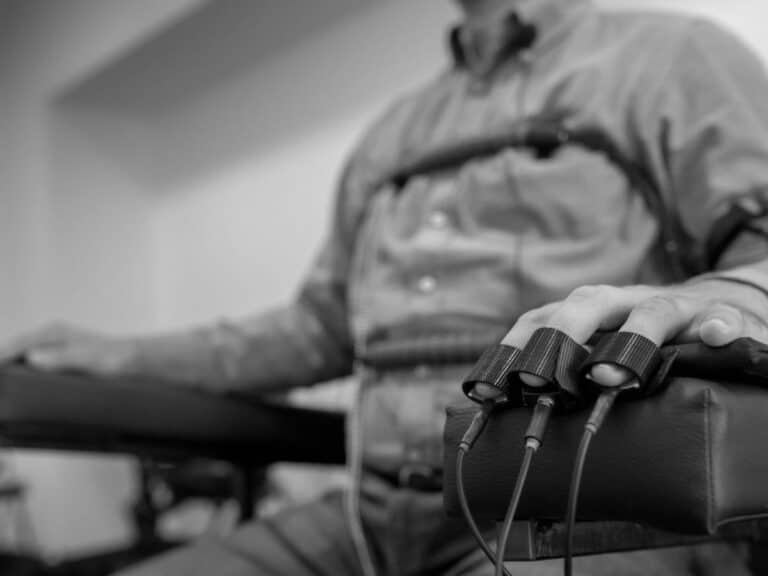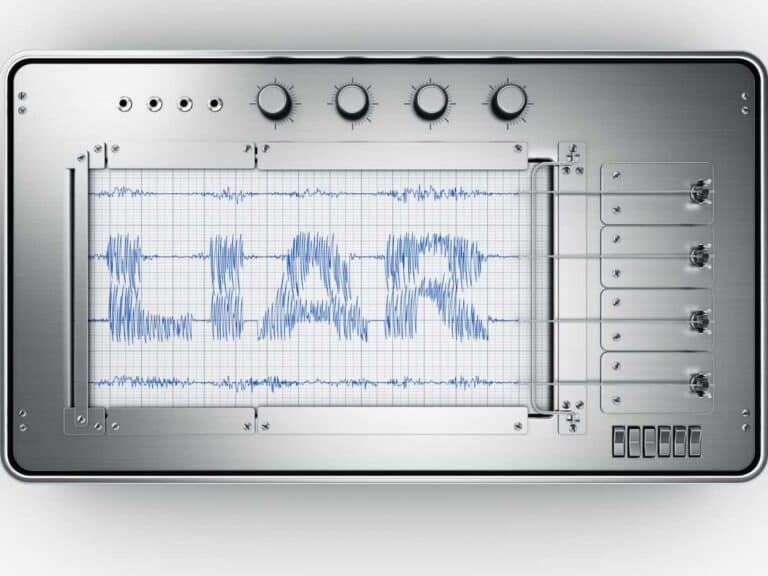What is a Baseline in a Polygraph Test?
Not too many people are aware of the fact that a polygraph examiner asks many other questions besides those that have something to do with the crime or misdemeanor being investigated. Some of those questions, which do not elicit any bodily responses, have to be answered in order to establish what’s referred to as a baseline reading.
A baseline serves as a starting point used for comparisons of several physiologic indicators such as blood pressure, heart rate, respiratory activity and skin conductivity of the examinee. It is established by the examiner by asking irrelevant questions and observing non-verbal communication cues.
Continue reading if you are wondering just how a polygraph examiner can tell honesty and deception apart.
This post is all about what polygraph experts refer to as a baseline — what its purpose is and how it’s established. If you are about to undergo a lie detector test anytime from now, having an idea of the different types of questions you will have to answer during the exam can help keep you from panicking, which is something that can cause you to fail it.

Baseline Physiological Readings
A polygraph machine’s job is to collect all kinds of physiological readings. Depending on the model and number of sensors integrated into it, some of the things that the instrument is engineered to pick up and record include the blood pressure, heart rate, respiratory rate and skin conductivity, which makes it possible to monitor sweating.
Making those readings make sense is the polygraph examiner, in particular when it’s time for him or her to evaluate the chart during what’s referred to as the post-test phase.
So, in other words, the lie detector test does not detect lies — it’s the examiner who does.
And in order for the examiner to be able to determine whether or not the subject of the polygraph test is lying, it’s a must to be aware of readings for when the examinee is being truthful and for when being deceitful. This is when the sheer importance of determining a baseline reading comes in.
Simply put, a baseline is the collection of physiological readings under a normal amount of stress — it gives the examiner an idea of what the subject’s blood pressure, heart rate and others look like when he or she is relaxed.
It’s against the baseline reading which other readings obtained throughout the lie detector test will be compared.
Each time the examinee feels stressed and anxious as a result of encountering a question that’s uncomfortable to answer (control question) and a case-related one (relevant question), there’s nowhere else for the individual’s various physiological readings to go but up — elevated blood pressure, accelerated heart rate, increased sweating, etc.
Changes in the vitals of the subject of the polygraph machine are what make it easier for the examiner to determine if the test is a pass or a fail. But there are instances, too, in which it can be hard for him or her to come up with a definite diagnosis, which is what’s referred to as an inconclusive result in the world of polygraphy.
There are times, too, when the result is an error, which is either a false positive or a false negative.
Irrelevant Questions
Above, I mentioned types of questions a polygraph examiner asks: control questions and relevant questions.
One of the most important things to know about these questions is that they are formulated in order to increase the stress levels of the examinee, which can then cause his or her physiologic processes, the ones that a lie detector machine is designed to monitor and record, to rise and alert the person who is conducting the test.
Control questions are questions designed to make the examinee feel uncomfortable to answer. So much so that, in some instances, it can push him or her to lie.
Some common examples of control questions are:
- Have you ever stolen something from someone?
- Have you ever lied in order to get out of trouble?
- Have you ever cheated or attempted to cheat in school?
It’s true that control questions are not directly related to the thing that is being investigated. Still, they can elicit the same physiologic responses as when lying when answering questions that are directly associated with the reason why the examinee is taking a lie detector test in the first place.
Meanwhile, relevant questions, just like what they’re called suggests, are relevant to the crime or misdemeanor that has led to the individual’s polygraph examination.
His or her vitals may stay the same or spike when answering relevant questions.
It will depend on whether or not the individual is being truthful. The physiologic readings of someone who answers relevant questions honestly are very much likely to be similar to the baseline readings, which were obtained when he or she was under a normal amount of stress.
The physiologic readings of someone who attempts to deceive the examiner when answering relevant questions, on the other hand, are likely to be through the roof as lying can cause increased stress levels.
Knowing what control questions and relevant questions are can make you understand irrelevant questions so much better. In a nutshell, irrelevant questions are questions that are so easy and comfortable to answer that the individual taking the lie detector test need not fabricate lies, thus keeping the various physiologic processes from spiking.
Some common examples of irrelevant questions are:
- Is your name (name of the examinee)?
- Is it (current time)?
- Am I wearing a brown jacket?
It’s of utmost importance for any polygraph examiner to ask irrelevant questions. That’s because they are the ones that allow him or her to establish a baseline reading, to begin with.
Non-Verbal Communication Cues
Other than asking irrelevant questions in establishing a baseline, the examiner also observes some of the subject’s non-verbal communication cues. Identifying changes in the behavior of the examinee can provide the examiner with additional information to consider when it’s time to evaluate the chart and come up with a report.
Some of the things that a seasoned polygraph examiner observes in the individual who is strapped to the lie detector machine include the following:
- Eye movements
- Facial expressions
- Hand gestures
- Posture
It’s a must for the examiner to pay very close attention to details when observing the examinee.
Some individuals, for instance, may blink more when being deceitful. Others, meanwhile, may blink less. Increasing hand gestures may signal truthfulness or deception, depending on the person. By comparing non-verbal communication cues with the readings of the polygraph machine, the examiner can easily determine which is which.
Related Questions
Can I pass a polygraph test by drinking alcohol beforehand?
There are many no-nos before taking a lie detector test. And one of them is drinking alcohol. Needless to say, the polygraph test will be canceled if the examiner notices that the examinee is intoxicated. A very small amount of alcohol, meanwhile, may help the examinee relax better.
Are there drugs that can affect the result of a lie detector test?
Drugs that can affect an individual’s various physiological processes such as the blood pressure and heart rate as well as the mental and cognitive status can affect or invalidate a lie detector test. Some of them are drugs for hypertension and mental illnesses like anxiety and depression.






